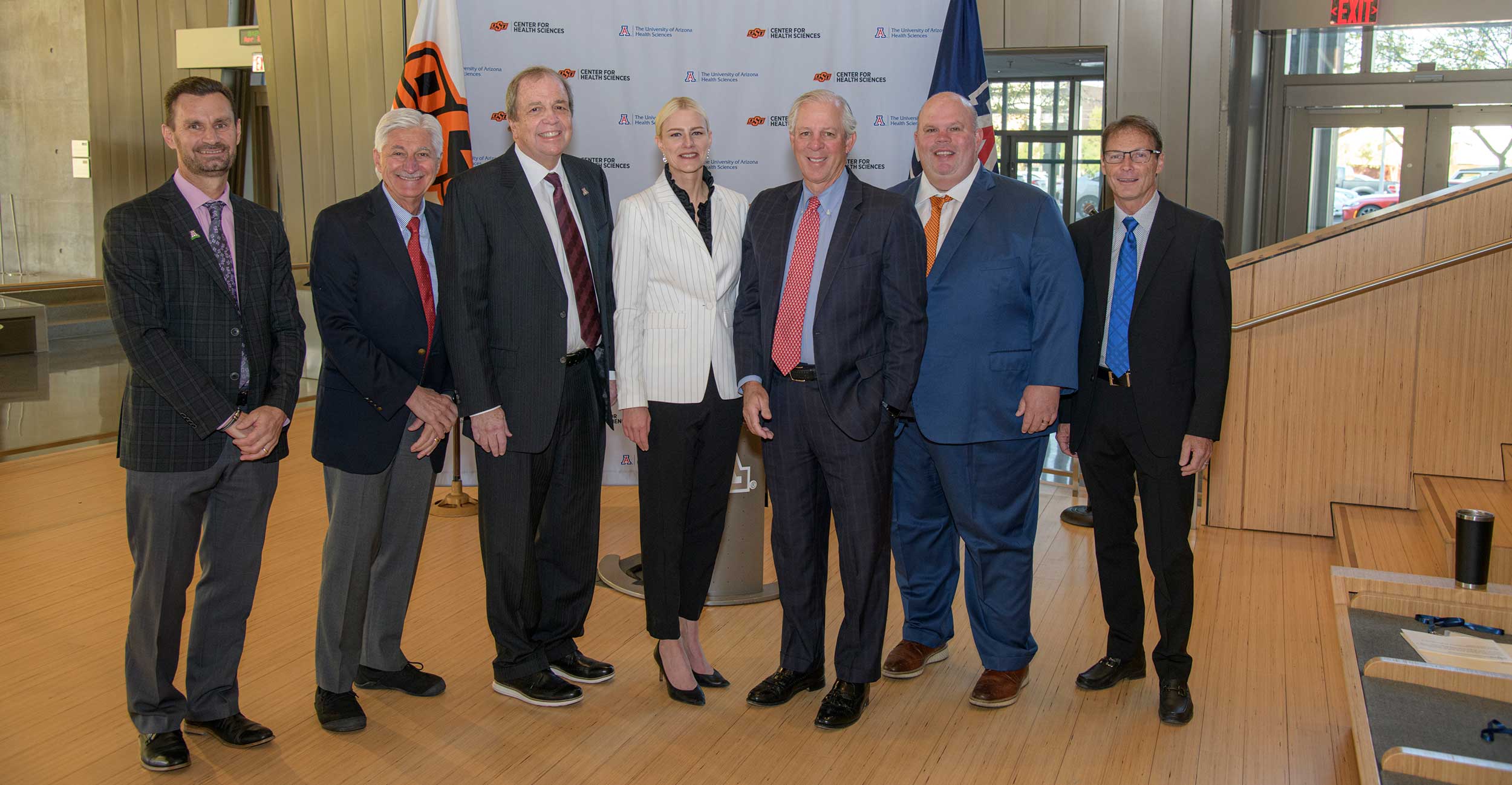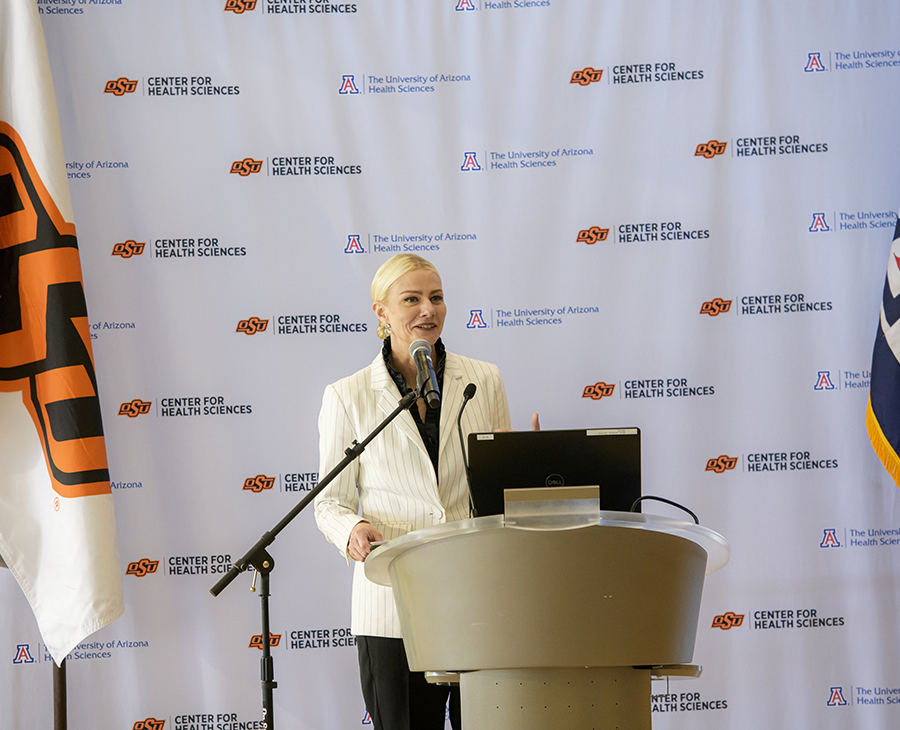
Transformative addiction research partnership announced between OSU, University of Arizona
Friday, April 29, 2022
Media Contact: Melani Hamilton | Managing Director of Marketing and Communications | 918-561-8462 | melani.hamilton@okstate.edu
Dr. Kayse Shrum, president of Oklahoma State University and Dr. Robert C. Robbins, president of the University of Arizona announced Friday the two institutions’ academic medical centers have joined forces to combat the opioid crisis and chronic pain through research, treatment and education.
The partnership, announced on the campus of University of Arizona in Tucson, will share institutional resources from three research centers — OSU Center for Health Sciences National Center for Wellness & Recovery (NCWR) with University of Arizona Health Sciences Comprehensive Pain and Addiction Center (CPAC) and the National Institute on Drug Abuse-funded Center for Excellence in Addiction Studies (CEAS) — to advance pain and addiction research and accelerate positive health outcomes in Oklahoma, Arizona and across the country.

The NCWR has access to approximately 18,000 novel research molecules from Purdue Pharma that were designed to target neuronal mechanisms associated with chronic pain and addiction. In addition, there are 40,000-50,000 human biosamples from consenting patients enrolled in more than 20 Phase 2 and 3 clinical trials involving opioids and non-opioids. Recently, the NCWR has begun collecting additional biosamples from patients suffering from addiction or who are in recovery and undergoing treatment at NCWR treatment centers in Oklahoma. These unique assets, collected over more than two decades, enable research into risk factors, causes and potential treatments for addiction and chronic pain.
The CPAC is composed of a group of world class scientists with expertise in the overlapping neurobiology of chronic pain and addiction whose work will be strengthened by the availability of novel chemical matter from the NCWR. The CEAS will provide expertise in genetic targeting, in the use of neuroanalytical methods, large data analysis and advanced behavioral assessment of these drug-like substances providing the critical data that can lead to advancement to clinical trials. Additionally, both the CPAC and the CEAS are committed to training paraprofessionals for the work force in substance use disorder and education for students as well as creating a Southwestern region addiction network with collaborations with university investigators in Arizona, New Mexico, Texas and Oklahoma.
“As a modern land-grant university focused on offering research that solves society’s most pressing problems, OSU is tackling a major issue head-on by addressing chronic pain and addiction in our state and nation,” Dr. Shrum said. “So many lives will be impacted by this partnership, and I am confident our collaboration will truly make a difference.”
So many lives will be impacted by this partnership, and I am confident our collaboration
will truly make a difference.
Donald J. Kyle, Ph.D., CEO of NCWR, agreed.
“The goal of NCWR is to identify and pursue innovative technologies to help address the opioid addiction crisis in our country,” he said. “Scientific collaboration is crucial for success in the challenging areas of pain and addiction research and this unique partnership represents a significant step in the right direction. The inherent synergies amongst the three centers will accelerate impactful scientific research and new medical treatments on a national scale.”
The goals of the three research centers are aligned with the National Institute of Drug Abuse and the NIH Helping to End Addiction Long term (HEAL) initiative and focused on combating the opioid crisis, ameliorating the suffering of chronic pain while decreasing opioid use, finding alternatives to opioids for treating acute and chronic pain, promoting recovery and prevention of relapse from opioid use disorder as well as development of rapidly acting medications for opioid overdose through advancement of novel chemistry, biology, therapies, clinical trials and education.
In addition to their general populations, Arizona and Oklahoma are home to Indigenous populations affected by drug addiction. The two universities share a common commitment to addressing the impact of substance use disorders and chronic pain in these populations.
The partnership involves sharing research assets and knowledge, as well as the preclinical and clinical expertise gleaned from years of research and treatment by scientists and clinicians at both universities. The University of Arizona Health Sciences CPAC and CEAS bring together world-class laboratory spaces along with preclinical and clinical expertise that can promote development of novel, nonopioid therapies based on existing chemical entities from NCWR as well as new chemistry and biology that can be jointly pursued by the three academic groups.
“The collaboration with Oklahoma State University and their National Center for Wellness & Recovery will exponentially grow research, clinical care, education and training programs at both universities," Dr. Robbins said. "This is one of those true, rare win-win situations. We believe by tackling chronic pain and opioid use disorder together, the University of Arizona and OSU will lead to the discovery of novel, non-addictive treatment for those with chronic pain while discovering new ways to treat substance use disorder."
